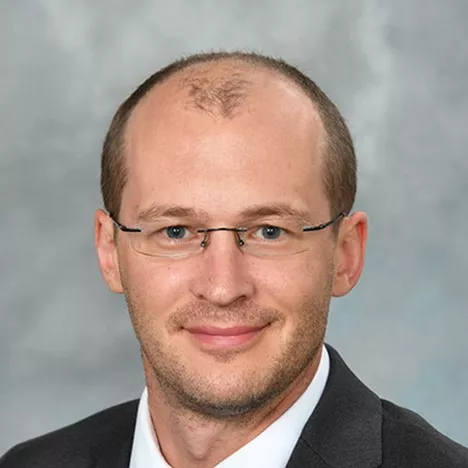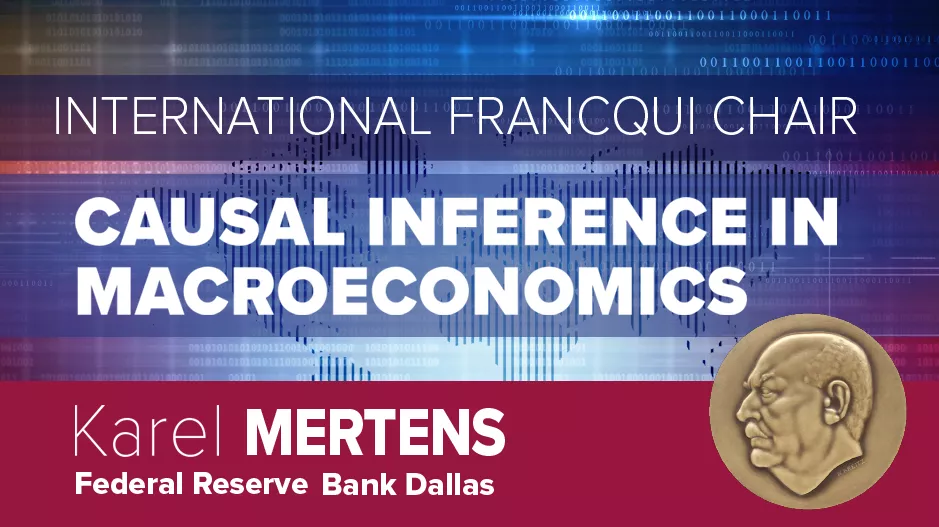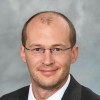
Your career in a few words ?
Karel Mertens: I studied at UGent (a sort of bachelor’s degree we used to call “licenciaat”). After that, I did a master’s in economics at the London School of Economics and a PhD in Economics at the European University Institute. My first job was at Cornell University, New York in 2007, as an assistant professor then as a tenured associate professor. I worked there for 10 years before moving to Dallas and the Federal reserve.
Can you explain what macroeconomics is?
Karel Mertens: I would describe macroeconomics as the study of the aggregation of all individual economic decisions made by individual agents (consumers, firms, …). Microeconomics is the field of economics that studies these decisions at the individual level: taking a lot of factors as given. Macroeconomics considers all these individual decisions together, and analyses how they are all inter-related through what we call general equilibrium effects.
Combined individual behaviour can generate various aggregate phenomena: business cycle fluctuations, changes in unemployment, inflation etc. These phenomena can be studied at the level of a nation, but also for the global economy as a whole in international macroeconomics, which considers how economies in different countries are inter-related through trade and financial linkages. I am more of a national macroeconomist, mostly analysing macroeconomic dynamics in the US economy.
You are Senior Economic Policy Advisor at the Federal Reserve Bank of Dallas. What does that consist of?
Karel Mertens: As you may know, the Federal reserve of the US is the US central bank. It consists of a board of governors in Washington D.C. That is sort of the equivalent of what the European Central Bank (ECB) in the Euro zone. But there are also 12 regional Federal reserve banks that are spread out across the whole of the United States. One of these regional banks is in Dallas.
They have several roles. The President of each regional bank is a participant in meetings of the Federal Open Market Committee (FOMC). The committee meets several times a year and makes decisions regarding monetary policy,, which involves setting the target range for short-term interest rates in the US.
What I do is two things main things. A lot of research – it is very similar to what economists in academia do. The goal is to publish articles in (high impact) journals. Then, instead of teaching, as you would do as a Professor, I play the role of Policy advisor. It involves using the insights of economic research from the academic literature and applying them to the policy questions of the day. It also involves a lot of processing of all the various kinds of information, like the official data releases on the state of economy: inflation, unemployment etc. It also involves gathering more local intelligence by talking to people in our district, talking to business and labour leaders, and various other members of the community to learn what they see on the ground in their local economy. It is gathering soft information and combining it with the aggregate statistics we get, analyze, and pass the conclusions on to the President for policy decision making.
You are the invited Professor of the International Francqui Chair. What does that involve?
Karel Mertens: I will be staying here for three months during which I will interact with the academics and PhD students in the department attend the seminars and so on. Other than that, I will also present my own research on Causal Inference in Macroeconomics with applications on issues related to fiscal and monetary policies. The talks for the “Class of Excellence” will be in Namur and in the other partner universities, I am also giving an inaugural lecture in Namur, will be a presentation about the U.S. monetary policy and research on monetary policy issues. We will also have a big international conference that will be held at the National Bank of Belgium on the 8 and 9 May 2023. There will be eight international speakers all in macroeconomics, some presentations by researchers of Belgian universities at the post-doc level, and two poster sessions where 16 PhD students and young researchers will be able to display their research and get feedback from the participants, (See more information below)
A word about life in the US vs life in Belgium
Karel Mertens: It was quite easy for my wife and I to settle in the US because there are a lot of foreigners in the US, especially in environments like Cornell University, where we first landed. There are people from all over the world. Not many people are really locals. There are of course some significant differences, but it is quite easy to make friends and build a social network. Also, we are familiar with American culture through movies and music.
I am now living in Dallas, which is quite different from Belgium. Dallas is situated in the North of Texas, in the South of the U.S., towards the Mexican border so the weather is not quite the same. It was 30° when I left Dallas some days ago. I’m not sure I have packed enough warm jumpers by the way!
A message to the community?
Romain Houssa, Department of Economics (UNamur): I am really proud Karel Mertens accepted to be with us. He was in competition with top researchers when we applied for this International Francqui Chair in 2021. I hope this Chair is a signal to give Karel Mertens a more prestigious prize. Paul Krugman, a famous American economist, was in KU Leuven for the Gaston Eykens Chair before he got the Nobel prize. Never know! 😉
Express CV
Karel Mertens is a renowned researcher who has done outstanding work in his field. He has published in several leading economic journals, such as the Quarterly Journal of Economics, American Economic Review, the Review of Economic Studies, the Journal of Monetary Economics, and the Economic Journal. He is a research fellow at the Centre for Economic Policy Research, and an associate editor of the American Economic Review.
He has worked on the topic of causal inference in macroeconomics, i.e., the science of distinguishing between cause and effect in macroeconomics. His research has helped in understanding the macroeconomic and redistributive effects of fiscal policy, and specifically taxation, on the effects of credit policy as well as monetary policy. He has also produced an indicator that makes it possible to measure economic activity more accurately in the United States on a weekly basis.

The programme
- 18 April 2023 | Inaugural lecture-Medal of the International Francqui Chair
- From 25 April 2023 | Classes of excellence
- 8-9 May 2023 | International Symposium
More about the international Francqui Chair in Macroeconomics on the website
